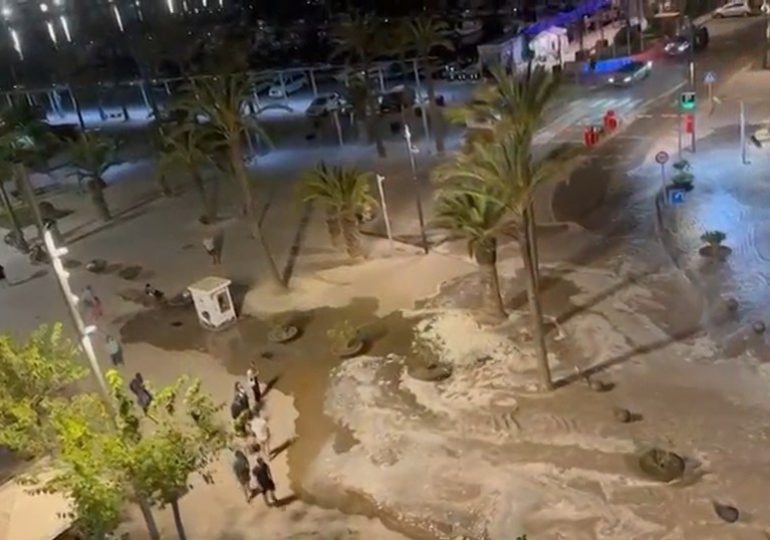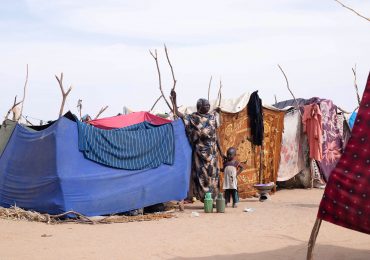SHOCKING footage shows a swollen ocean spill onto the shore of a tourist resort in Majorca.
The sea level rose sharply and flooded parts of Puerto Alcudia, on the northeast coast of Majorca.
Swollen ocean spilled onto the streets of a resort town in Majorca
The sea level rose sharply and flooded parts of Puerto Alcudia
The flooding caused by meteo-tsunami was seen swallowing up the roads
The island was hit by 5ft waves meteo-tsunami in 2018
Ocean waters can be seen swallowing up shore roads as tourists waddled around it in a bid to avoid getting wet.
An amber weather alert for the Spanish island was issued on Tuesday.
Spain’s national weather agency AEMET has warned of 40 to 70 per cent possibility of “rissaga”, or meteo-tsunami happening between Wednesday 6pm and Thursday 8am.
Meteotsunamis are triggered by rapid air pressure changes due to fast-moving weather events such as thunderstorms.
Aemet met agency spokesperson, Miquel Gili, explained that the meteo-tsunami in Majorca was triggered by variations in atmospheric pressure caused by storms.
He said: “Pressure variations affect sea level. If the pressure increases, the sea drops; if the pressure drops, the sea rises.
“The main characteristic of these rises and falls is that they occur over very short periods. In just 15 minutes the sea level can rise or fall very noticeably and then return to its normal state.”
There was no significant damage caused by the freak weather phenomenon.
But back in 2018, a meteo-tsunami devastated several holiday resorts, with waves crashing into bars and terraces by the coast in the island’s Port Andratx.
A German dad-of-two died after being swept to sea in Majorca – just hours after the tsunami laid waste to the holiday island’s beaches.
A massive wave – measuring nearly five feet – smashed into Menorca’s port city of Ciutadella.
Yacht owners were filmed desperately trying to stop their boats being washed away.
The strong current broke the ropes of a historic sailing boat used by the Majorca Island Council – which had to be rescued by sailors and brought back to port as it drifted out to sea.
One shocking clip showed desperate boat owners battling to keep their yachts from being washed away as the wave pounded a jetty in Port Andratx, Majorca.
What is a meteotsunami?
Meteotsunamis are freak weather phenomenon that cause large, tsunami-like waves.
They are triggered by disturbances in air pressure caused by fast-moving weather events, like thunderstorms, and are generated when rapid changes in barometric pressure cause the displacement of a body of water.
Most tsunamis are geological, meaning they are triggered by vertical movement on the seabed, which can be caused by an earthquake or landslide.
The difference with a meteotsunami is that they are created by the weather.
A small, rapid change in atmospheric pressure – even by a few millibars – can change the sea surface elevation by a few centimetres.
This elevation can go unnoticed in deep water, but in shallower water near shorelines, it can cause the sea level to rise significantly, often by several feet.
They can reach heights of six feet and more, and have been observed in many places around the world, including Gulf of Mexico, Atlantic Coast and the Mediterranean.
Meteo-tsunamis can also be easily mistaken with a seiche.
However, unlike seiche, they only last between few minutes to a couple of hours and can affect both enclosed basins and large areas of coastline.
Most recently, Majorca was battered by torrential rain, causing travel chaos as hundreds of holidaymakers were left stranded.
Runways of the Palma de Mallorca airport were seen submerged underwater as planes were cancelled or diverted due to “zero visibility.”
Airport bosses halted all operations after the severe flooding turned the airport’s runway into a river.
Pictures showed planes grounded on the swamped tarmac while the airport workers were seen wading through knee-high floods.
Frustrated travellers were pictured sheltering from the rains inside the airport which welcomes around 30million passengers each year.
In Murcia, cars became stranded in the sodden streets while garbage bins floated down the road as storms continued into the next day.
Floods have also hit other holiday hotspots in Costa Blanca, including Benidorm, Valencia and Alicante.
Majorca was battered by torrential rains on June 11
Hundreds of holidaymakers were left stranded as flights were cancelled
Pacific Coast NewsRoads could be seen turned into rivers as downpour lasted for 48 hours[/caption]
Leave a comment








